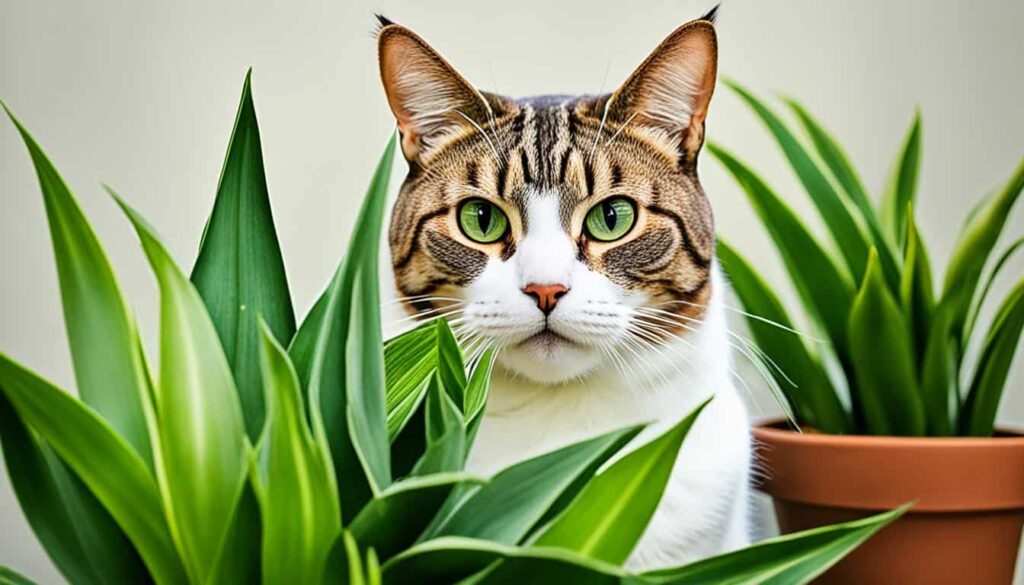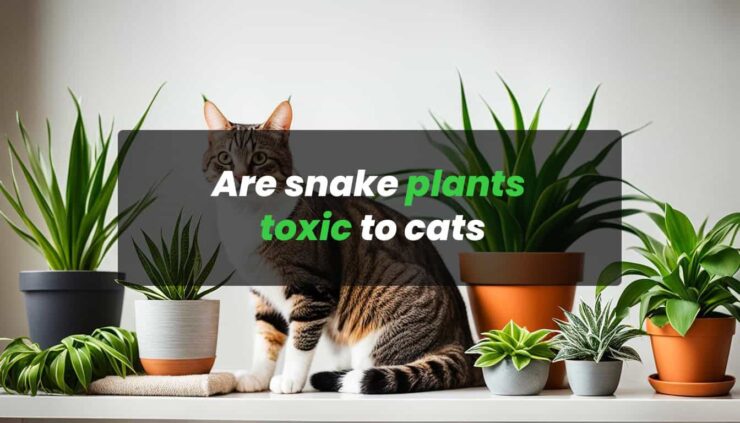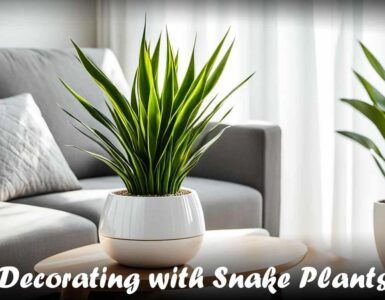What do you think Are Snake Plants Toxic to Cats? As a pet owner, keeping your pets safe is key. For indoor plants, many wonder if snake plants are harmful to cats. You might be surprised that these tough and helpful plants can be dangerous for your cats.
Snake plants, or Sansevieria, have saponins. These are chemicals that can affect a cat’s cells. If a cat eats these plants, it can cause problems like irritation or swelling. It’s important to know that snake plants could be harmful if your cat eats them.
Toxicity of Snake Plants: Understanding the Risks
Snake plants are loved for being tough and easy to care for. But, they also come with dangers. They have saponins, which are natural but can harm pets like cats and dogs.
Chemical Composition: What Makes Snake Plants Toxic?
Saponins defend snake plants from animals and bugs. They can affect cell membranes in pets’ bodies. This leads to stomach trouble like nausea, vomiting, and diarrhea.
Why Are Snake Plants Toxic to Pets?
- Snake plants contain saponins, which defend them but are harmful to pets.
- These saponins can irritate and inflame animal stomachs and intestines.
- Pets might get sick if they eat any part of a snake plant.
- This makes snake plants a big danger to pets, so owners need to know.
| Toxic Compound | Effect on Pets | Symptoms of Ingestion |
|---|---|---|
| Saponins | Disrupt cell membranes, leading to inflammation and irritation | Nausea, vomiting, diarrhea |
“Saponins are a class of natural chemical compounds found in a variety of plants, including snake plants. These compounds can be toxic to pets when ingested, leading to gastrointestinal distress and other adverse effects.”
Knowing about snake plants’ chemicals and dangers is key for pet owners. With this knowledge, you can keep your pets safe while enjoying these beautiful plants.
are snake plants toxic to cats?
Knowing what could harm our cats is crucial for their well-being. The snake plant, also known as Sansevieria, is a common indoor plant that makes cat owners worry. Yes, snake plants are toxic to cats, but the level of danger is usually low.
The danger lies in the plant’s saponins, found in its leaves. If a cat eats some, they might show signs like sickness, a swollen mouth, or not wanting to eat. They might feel sad, their stomach could hurt, and they could have a dry mouth.
Despite most cases not being severe, it’s smart to keep snake plants away from cats. This ensures your pet stays safe and healthy. Keeping these plants unreachable is important.
For your cat’s safety, avoid having snake plants at home. If you already do, put them where your cat can’t get to them. And, check often if there are any parts fallen off the plant. Removing these temptations is part of keeping your cat safe.
- Snake plants are risky for cats due to their saponins.
- Eating snake plants may give cats a bad stomach, make them feel sad, or cause other issues.
- The danger is usually not very high, but keeping snake plants away from your cat is crucial.
Being careful and knowing the risks is vital for your cat’s safety. Prevention is your best tool when it comes to snake plants and cats. This simple step will help keep your home beautiful and your pet happy and healthy.
“Protecting our pets from potential dangers is a top priority for responsible pet owners.”
The Effects on Dogs: How Toxic Is Sansevieria to Dogs?
Snake plants, known as Sansevieria, are toxic to dogs but less so than cats. Ingesting a snake plant can make a dog sick. They might vomit, have diarrhea, and feel tired. In severe cases, eating these plants could lead to hemolysis, where red blood cells break.
Snake Plant Poisoning in Dogs: What Happens If My Dog Eats a Snake Plant?
If a dog eats a snake plant, it can get an upset stomach. This might cause vomiting, nausea, and diarrhea. They could also feel tired and drool a lot. The worst-case scenario is hemolysis, a serious health condition.
The poisoning symptoms are less severe for dogs than for cats. But, always get help from a vet if you think your dog ate part of a snake plant. Quick treatment is key to making your pet feel better and avoiding serious issues.
Can a Snake Plant Kill a Dog?
Most dogs will not die from eating a snake plant. Quick medical help and limited plant intake reduce the risk. These plants can cause discomfort or minor health problems. Lethal effects on dogs are rare.
The disease’s severity depends on the dog’s size, age, and health. Suspecting a snake plant ingestion means immediate vet contact. This ensures the safety and well-being of your pet.
Even though snake plants are less harmful to dogs, prevention is critical. Keep snake plants away from your pets. Being cautious protects your furry friends and keeps your home happy.
Preventive Measures and Safety
Keeping your home safe for pets is vital if you have a snake plant. There are many ways to stop pets from eating these harmful plants. You can put the plant in hard-to-reach places, like high shelves or hanging planters.

You can also use things like bitter sprays to make the plant unattractive. This approach helps keep pets from getting sick by eating the plant. Offering pets safe chewing toys and grasses can also distract them from the snake plant.
- Elevate the snake plant on a high shelf or hanging planter
- Use pet-safe deterrents, such as bitter sprays, on the plant
- Offer your pet alternative chewing toys or pet-friendly grasses
By taking these easy steps, you’ll protect both your pets and your indoor plants. Always put your pets’ safety first to have a happy and healthy home.
“Protecting our furry friends from potential harm is our responsibility as pet owners. By taking proactive steps to keep snake plants out of reach, we can ensure a safe and enjoyable indoor environment for both our beloved pets and ourselves.
Pet-Safe Plant Alternatives to Snake Plants
If you’re a pet owner wanting a green space indoors, look no further than pet-friendly indoor plants. These plants are safe for both cats and dogs. They add beauty to your home without posing a risk to your pets.
Top Non-toxic Plants for Homes with Pets
Looking for safe alternatives to snake plants? Here are some great options:
- Spider plants: These are not only pretty but also safe for cats and dogs.
- Peacock plants (Calathea): They have beautiful, colorful leaves and are safe around pets.
- Chinese evergreen: This plant is great for various room settings and safe for pets.
- Boston fern: Known for its beauty, this fern is also harmless to pets.
- Air plants: Air plants are low-maintenance and perfect for pet owners.
To keep your pets safe, choose pet-friendly indoor plants. This way, you and your furry friends can enjoy the greenery together.
“Choosing non-toxic plants is an important step in creating a safe, healthy environment for your pets.”
Conclusion
Snake plants are good for cleaning the air and look wonderful in your home. But, they can also be harmful to pets, especially cats. It’s key to know about snake plants and how they can affect your pets.
To keep your pets safe from these plants, there are a few steps you can take. You might put the plants up high or use things that stop pets from getting near them. You could also find other plants that won’t hurt your pets. Doing this helps keep both your plants and pets happy and healthy.
Choosing pet-safe houseplants is important. It changes whether snake plants are dangerous to pets. Luckily, many plants are safe for pets and still look great. This way, you can have a beautiful home that’s also safe for your furry family members.





Add comment